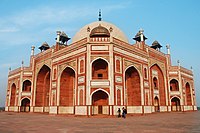Hair Replacement in Delhi, India
Delhi is the capitol city of India and it is one of the most populous city, as a result it can be one of the most popular places to travel for vacation and get a hair Replacement too. It’s expected to become almost as large as Tokyo and Mumbai and not only home to residential areas but also offering rich culture to check out while visiting for a hair Replacement. The average cost for a basic Hair Replacement session here is around RS 70,000 ($1000). This will include the basic cost of surgery, blood tests, hair growth therapy sessions, the surgeon’s fees and more.
If you are considering coming to Delhi to receive a consultation for hair Replacement surgery you should keep in mind just how much cheaper this type of cosmetic surgery can be in India vs other parts of the world.
With the average cost of hair Replacement surgery in India starting at an average of 60,000RS (878.99 USD) throughout India and rising to an incredible minimum cost of $1550 in the United States you can save an average of 70-75% on the cost of your surgery simply by getting it done in India. With a whole host of qualified surgeons are working across Agra, Hyderabad, Pune, Jaipur and more. An increasing number of medical tourists are making their way to India each year for these types of procedures. Not only is hair Replacement surgery more common, but with the cost savings that can be had in India FUT and advanced hair Replacement surgery is on the rise as well!
With cosmetic surgical procedures becoming increasingly cheap and accessible, having the appearance you've always wanted is no longer the vaunt of the young population. And since male pattern baldness is at the top of the list of things men would like to change about their looks, it's no wonder that the hair Replacement is becoming one of the most popular solution to hair loss which appear to be mostly a hereditary problem.
Facts about Delhi
- Delhi is the capital territory of India
- Delhi has been continuously inhabited since the 6th century BCE. Through most of its history, Delhi has served as a capital of various kingdoms and empires. It has been captured, ransacked and rebuilt several times, particularly during the medieval period, and modern Delhi is a cluster of a number of cities spread across the metropolitan region.
- Delhi borders the Indian states of Haryana on the north, west and south and Uttar Pradesh (UP) to the east.
- Delhi features an atypical version of the humid subtropical climate (Köppen Cwa). The warm season lasts from 9 April to 8 July with an average daily high temperature above 36 °C (97 °F). The hottest day of the year is 22 May,
- Delhi is the largest commercial centre in northern India; in financial year 2009-10 it had a gross State Domestic Product of ?2176 billion (US$32 billion).[111] As of 2013, the per capita income of Delhi was Rs. 210000, the second highest in India.
- Delhi has the highest road density of 2103 km/100 km2 in India.
- Delhi's culture has been influenced by its lengthy history and historic association as the capital of India. This is exemplified by many significant monuments in the city.
Images from around Delhi, India
|
Red fort

|
Humayun's Tomb
 |
| Delhi Metro Station
 |
Swaminarayan Akshardham
 |
Wha is Hair Replacement
Hair transplantation is a surgical technique that moves hair follicles from a part of the body called the 'donor site' to a bald or balding part of the body known as the 'recipient site'. It is primarily used to treat male pattern baldness. In this minimally invasive procedure, grafts containing hair follicles that are genetically resistant to balding, (like the back of the head) are transplanted to the bald scalp. Hair transplantation can also be used to restore eyelashes, eyebrows, beard hair, chest hair, pubic hair and to fill in scars caused by accidents or surgery such as face-lifts and previous hair transplants. Hair transplantation differs from skin grafting in that grafts contain almost all of the epidermis and dermis surrounding the hair follicle, and many tiny grafts are transplanted rather than a single strip of skin.
Since hair naturally grows in groupings of 1 to 4 hairs, current techniques harvest and transplant hair "follicular units" in their natural groupings. Thus modern hair transplantation can achieve a natural appearance by mimicking original hair orientation. This hair transplant procedure is called follicular unit transplantation (FUT). Donor hair can be harvested in two different ways: strip harvesting, and follicular unit extraction (FUE).
Method of Hair Replacement in Delhi
The most popular hair transplant methods are: Follicular Unit Hair Transplants (FUT) and Follicular Unit Extraction (FUE). Both methods involve follicular transplant, meaning follicles are extracted from donor area and transplanted in the recipient area; but the way follicles are extracted and transplanted is different in each case. Hair follicles are taken from patients themselves, mostly from the backside of the scalp.
In FUE, individual follicles are extracted from the donor area and transplanted to the recipient area one by one; whereas in FUT, also known as strip method, a strip of hair follicles is taken out from the donor area and transplanted on the area with baldness. Strip method is regarded as the golden standard in hair transplant because it has higher success rate; however, this procedure results in a linear scar on the donor area.
FUT method is simple and cost effective because it involves less number of incisions on the scalp. A single strip may be used to implant a large number of grafts, up to 5000 or more. This method is better for treating extensive baldness covering large areas on the scalp. Compared to FUE, FUT involves less blood loss and pain. The procedure can be completed much quicker than FUE. Also, in FUE the chances of hair follicles getting damaged are also less because donor area suffers from less shock from the surgical procedures. Another advantage of FUE method is that donor area need not be shaved, so there will be no disfigurement of the existing hair as the donor area will be easily covered by existing hair surrounding it.
Either procedure ( strip harvesting or follicular unit grafting) is carried out under local anesthetic, and for male pattern baldness, an average of 2500 hair follicles are re-established in the recipient area per session. Depending on which procedure you opt for, the healing time varies between 1-2 weeks.
Procedure of Hair Transplant in Delhi
There are two main procedures for transplanting; grafts harvesting or graft transplanting. Whichever one, the procedure is done under local anesthesia tumescent technique.
For several days prior to surgery the patience refrains from using any medicines which might result in intra-operative bleeding and resultant poor "take" of the grafts. Alcohol and smoking can contribute to poor graft survival. Post operative antibiotics are commonly prescribed to prevent wound or graft infections.
It involves about seven to eight hours. At the end a protective dressing is done which is removed after two days.
The recovery time is immediate and the pain negligible. It is pertinent to note that hair transplant operations are performed on an out patience basis
During the first six weeks, shafts of virtually all of the transplanted hairs will fall out leaving their bulbs behind. After two to three months new hair will begin to grow from the moved follicles. The patient's hair will grow normally, and continue to thicken through the next six to nine months.
The patience is advised to wash his head after six days and is also advised to wear a soft cap to avoid direct exposure to sunlight till the hair growth starts.
Cost of Hair Replacement in Delhi
There is no argument about the cost of hair transplant procedures: they are indeed costlier, making many of us believe that it is affordable to celebrities alone. The U.S and Europe are costlier than the rest of the world. For example, the most popular Follicular Unit Extraction (FUE) procedure will cost $7-9 per graft and $3-7 per graft for Follicular Unit Transplant (FUT or strip method) in the U.S and Europe. On an average, a typical hair transplant session can cost between $6,000 and $15,000 in these countries.
Individuals looking for cost-effective hair transplant surgeries can also get the process done from other countries. Argentina, Colombia and India are offering cheaper hair transplants to patients all over the world. Some of these countries are offering these plans under "health tourism" package, which also comprises air fare, accommodation and other facilities. The entire package, including the surgery, may come under $5,000 in these countries.
For example, in India the cost of hair transplant is only about 25 percent of that done in the United States. The average cost of FUT (strip) in a good center in India is $1 approx per follicle. The standard cost of FUE in India at a world class center would be $1.5 approx per follicle. Some of the well-known hair transplant centers in India offer advanced treatments like tricophytic closure designed to minimize the scars and make them invisible or small.
Benefits Hair Transplant Surgery
Like any surgery, there are pros and cons, and benefits and risks associated with having the procedure done. For many the desire to no longer have a bald scalp can far outweigh concerns over scaring or costs that may worry others.
Here are few 5 benefits to keep in mind as you research for your hair Replacement journey.
- Better Looks
- A Permanent Solution
- Improved Self-Esteem
- Cost Savings
- A Natural Appearance
How to Find a Good Hair Replacement Surgeon in Delhi
A good place to start is through word of mouth recomendations. If you know someone who has had hair Replacement surgery, go to them for advice. Regardless of their testimonial you can easily check the quality of the surgery by looking at the hair on their head. Also you should as questions like whether or not they felt they were treated professionally and if there were any hidden fees associated with their procedure.
If you don't know anyone who has had hair Replacement surgery, you can hop on the Web and perform a search of flip to the pages of the phone book as a starting point there are a number of doctors who advertise their services. What's not apparent in these ads is whether or not they are expereenced and well skilled, but it can be a starting point for you to go and check out them out or simply form below to connect to one of the qualified surgeon near you.
Map of Delhi
Frequently asked questions about hair transplant procedures
How much does a hair transplant cost?
Hair transplants can vary in price based off of the area in the world that you are interested in getting a hair transplant as well as the size of the area where you may need a hair transplant. Experienced doctors in the United States will often charge some of the highest prices for a hair transplant worldwide and this is why so many travelers make the move to other parts the world like Turkey, India, Thailand, Mexico...etc for their hair transplants.
Will a hair transplant hurt?
Although hair transplants may look like a particularlyunpleasant or painful experience is actually very little discomfort involvedwith the surgery itself. Hair transplants are always done under an anesthetic so there's absolutely zero pain during the treatment itself. Many people actually relate the process as being very similar to going to the dentist for filling or root canal. Mild pain can persist over the course of postop treatment but he generally just resumes for a few days.
Who can deliver the best surgery?
It's usually best to consider working with surgeons who have and IAHRS certification or international alliance of hair restoration surgeons recognition. IAHRS can often deliver recommendations for the best surgeons in each particular area.
Is this scarring noticeable?
Any type of hair transplant will require the use of incisions throughout the scalp. There can also sometimes be a small scar from the donor area towards the back of the scalp. Asking to look at photos of the surgeon's previous work will help you to see roughly how bad the scarring could be. In most cases an experienced professional can limit the look of scarring and noticeable marks from the surgery.
How long does it take for the hair to grow?
In most cases hair growth will start within eight months and you can start to see a full effect from the hair transplant after a full year. The initial signs of growth can usually start between 3 to 4 months after the surgery.
Are the results permanent?
The hair follicles that are transplanted are generally the ones which are genetically resistant against the symptoms of baldness. As long as you receive hair loss treatment later in your life after the symptoms of balding have started to subside, you can have a better chance at permanent results.
While everyone know you've had surgery?
If you want to limit the chance that people may find out about your surgery it's important to give at least three weeks of healing as the surgical area will be affected and red just after surgery. After around a month of healing it can look far less noticeable. You could consider wearing a hat while time passes or opting for some extra time off if possible.
How long should I rest after surgery?
It's recommended to rest for at least a few days after surgery so that your body can recover. Trenton to over exert yourself and limit sexual activity, running in the gym for around 10 days after surgery.
Is it possible to lose more hair as a result of surgery?
There is always a chance of shock loss which happens when the hair is weak and miniaturizing after the surgery. As long as the surgeon is choosing the correct hair follicles and performing the surgery well it's possible to minimize the chance of this happening however.
Will I need another hair transplant?
The need for another transplant really depends on the individual. With a solid foundation surgery and working to potentially bolster results with drug therapy, you can improve the stability of the hair that was transplanted as well as prevent further loss. Getting a hair transplant earlyon in your 20s or early on in life could lead to needing long-term transplants as hair loss can be progressive.
Hair Transplant in Delhi, Hair Replacement Delhi, India, Hair Restoration in Delhi,Hair Implant in Delhi,Hair Loss Treatment in Delhi,Hair Surgery in Delhi,Hair Transplantation in Delhi,Hair Transplant Cost in Delhi, Hair Transplant Procedure in DelhiHair Transplant in Mumbai, Hair Replacement Mumbai, India, Hair Restoration in Mumbai,Hair Implant in Mumbai,Hair Loss Treatment in Mumbai,Hair Surgery in Mumbai,Hair Transplantation in Mumbai,Hair Transplant Cost in Mumbai, Hair Transplant Procedure in Mumbai, Hair Transplant in Chennai,Hair Transplant in Bangalore,Hair Transplant in Kolkata,Hair Transplant in Hyderabad,Hair transplant centers in Bhopal, India, Hair transplant centers in Rishikesh, India, Hair transplant centers in Goa, India, Hair transplant centers in Vijayawada, India, Hair transplant centers in Guwahati, India, Hair transplant centers in Mangalore, India, Hair transplant centers in Mohali, India, Hair transplant centers in Faridabad, India, Hair transplant centers in Tirupati, India, Hair transplant centers in Jamshedpur, India, Hair transplant centers in Vapi, India, Hair transplant centers in Nellore, India, Hair transplant centers in Agra, India, Hair transplant centers in Haridwar, India, Hair transplant centers in Ranchi, India, Hair transplant centers in Rohtak, India, Hair transplant centers in Panchkula, India, Hair transplant centers in Siliguri, India, Hair transplant centers in Secunderabad, India, Hair transplant centers in Nagercoil, India, Hair transplant centers in Chinchwad, India, Hair transplant centers in Moradabad, India, Hair transplant centers in Durgapur, India, Hair transplant centers in Jaipur, India, Hair transplant centers in Nagpur, India, Hair transplant centers in Jaipur, India, Hair transplant centers in Lucknow, India, Hair transplant centers in Ludhiana, India, Hair transplant centers in Patna, India, Hair transplant centers in Gurgaon, India, Hair transplant centers in Visakhapatnam, India, Hair transplant centers in Indore, India, Hair transplant centers in Vadodara, India, Hair transplant centers in Noida, India, Hair transplant centers in Coimbatore, India, Hair transplant centers in Dehradun, India, Hair transplant centers in Jalandhar, India, Hair transplant centers in Kochi, India, Hair transplant centers in Ahmedabad, India, Hair transplant centers in Pune, India, Hair transplant centers in Chandigarh, India, Hair transplant in Chandigarh, India, Hair transplant Doctors in Chandigarh, India, Hair transplant cost in Chandigarh, India, Hair transplant centers in Surat, India, 10 Best Hair Transplant Centers in Jaipur,Tirunelveli, Gorakhpur, Nashik, Pimpri, Kalyan, Thane, Meerut, Nowrangapur, Ghaziabad, Dombivli, Rajkot, Varanasi, Amritsar, Allahabad, Teni, Jabalpur, Haora, Aurangabad, Shivaji Nagar, Solapur, Srinagar, Coimbatore, Jodhpur, Madurai,







